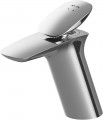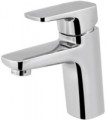Jet depth
Distance from the fixing point (for vertically mounted taps) or from the centre of the mounting hole (for horizontally mounted taps) to the middle of the spout. It is a characteristic that determines the "reach zone" of the tap.
Jet height
The jet height is usually specified for taps with horizontal installation (see "Type of installation"). It is measured from the base of the tap to the spout outlet. The large height of the spout is important primarily for kitchen models (see "Suitable for"), because it allows you to place large dishes in the sink. This parameter is directly related to the height of the spout (see above): the height of the jet cannot be greater than the height of the spout. Thus, in fact, one has to find a compromise between the height of the jet and the dimensions of the tap, especially if there is little space for its installation.
Water jet angle
The angle of the water jet produced by the tap, relative to the vertical. Generally stated for full head; with partially blocked water, this angle is smaller. Anyway, the water jet is usually directed towards the user, and the greater the angle of inclination, the farther from the spout the point of incidence of the jet will be placed. However, in most cases this point is not critical; problems can arise only in very cramped conditions, with small basin sizes.
Min water pressure
The lowest inlet pressure at which the tap is able to fully perform its functions of unhindered water supply.
Max water pressure
The highest inlet pressure at which the tap is able to operate in a trouble-free mode with minimal risk of premature failure. In other words, this is the ultimate strength of the tap. Note that for normal east european use, it can be assumed that the maximum pressure in the water supply is 6 bar. One should focus on that value and choose a model with a small margin of max pressure in order to avoid leaks in the tap nodes during pressure surges in excess of the norm. Note that in plumbing with a centralized water supply, the pressure can reach 10 bar. Therefore, for expensive taps that make high demands on the inlet pressure, it is necessary to buy special reduction gears.
Mounting hole diameter
The diameter of the holes required to install the tap. This dimension allows you to assess whether the tap will be compatible with a sink, wall, etc., what dimensions the additional parts should have to install it, and whether the holes will need to be widened or narrowed.
Depth
The distance from the extreme front to the extreme back of the tap determines the installation possibilities of the device. In comparison with the depth of the jet, it gives much more visual data precisely on the dimensions of the entire tap, especially for models where there is either no spout (built-in models) or the spout is not the longest part of the set (vertical taps).
Manufacturer's warranty
The warranty period claimed by the manufacturer for a certain tap model is the period during which the manufacturer guarantees the normal operation of the device. The specific terms of the warranty may vary, however, usually, it covers factory defects and malfunctions caused by the fault of the manufacturer or seller and discovered during normal use, without violating the rules; if such defects or malfunctions appear during the warranty period, the manufacturer undertakes the obligation to correct the situation at its own expense — up to replacing the tap with a working one.
Nowadays, you can find taps with a guarantee of
4 years,
5 years,
7 years,
10 years and even
25 years. In general, the longer the warranty period, the more reliable the product is, the higher its overall quality, ceteris paribus, but the more expensive it will cost compared to analogues.

